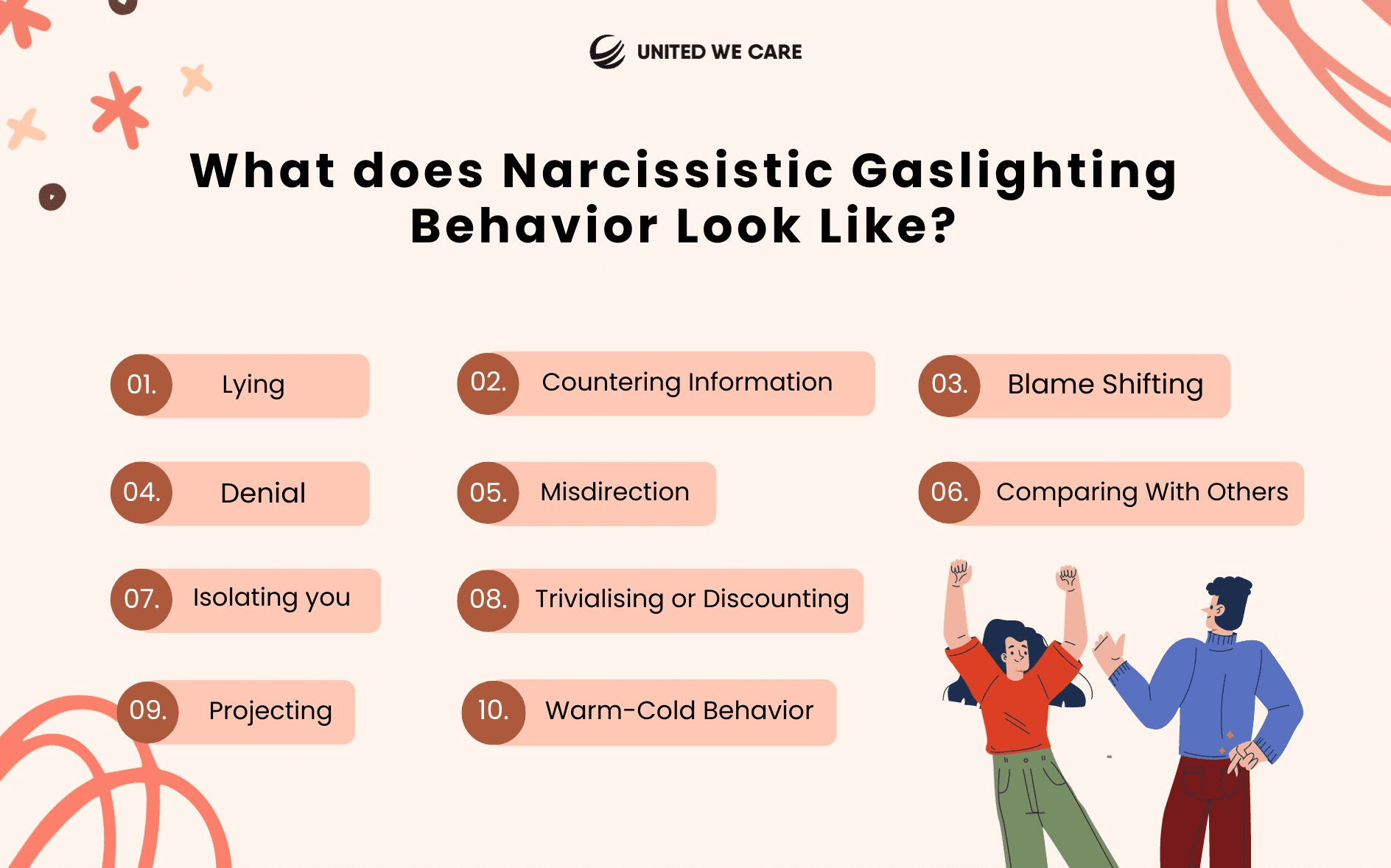Introduction
“He said there was no letter; he said that I’m going out of my mind”, said Paula, to which Cameron replied, “You are not going out of your mind; you are slowly and systematically being driven out of your mind”.
Above are the famous lines from the 1944 classic movie Gaslight, which eventually became the origin of the term “gaslighting”. Gaslighting is a form of psychological abuse where one person makes the victim question their perception and memory, eventually instilling a deep sense of self-doubt. Narcissists often use these techniques to gain control over other people. When you are a victim of gaslighting, facts and reality can feel distorted, and everything might seem overwhelming. You can identify what narcissistic gaslighting is and learn strategies to protect yourself from it.
What is Narcissistic Gaslighting?
Gaslighting is a form of psychological manipulation and abuse where the abuser manipulates the person by denying their sense of reality, memory, and perception. They may directly tell you you are wrong to believe something, lie about small details, and make you doubt yourself [1]. Gaslighting is insidious as eventually the victim feels as if they cannot trust themselves and it is them who are wrong in the situation in question.
Narcissists and people with narcissistic personality disorders often use gaslighting as a form of gaining control over others. They use others around them to keep their sense of reality intact and enhance their self-esteem [2]. They need to maintain their power and their belief that they are the best. This means if they are wrong, which they often are, they will not be able to take criticism or blame. So they make you believe that you are the one who is wrong by challenging your beliefs, your reality, your emotions, and your preferences. They create a power dynamic and take control of the narrative by using means of gaslighting.
What does Narcissistic Gaslighting Behavior Look Like?

Narcissistic gaslighting can take many forms. But one common thread in all of them is to shift the focus away from the flaws of narcissists and shine a light on the real or fake flaws of the other person. Some common techniques narcissists use for gaslighting are [1] [3] [4] [5]:
- Lying: The most common form of narcissistic gaslighting is when they directly lie about what happened in the past, what they said or what happened at a place.
- Countering Information: They will provide you with information opposite to what you have, twist facts around, and even twist what they say to make it sound like your information is wrong.
- Blame Shifting: They will shift the blame and responsibility onto you or someone else when they are at fault.
- Denial: By using techniques like questioning your memory or interpretation, narcissists deny their role or responsibility. They may even deny facts and real-life events by telling you that it is in your head.
- Misdirection: Narcissists tend to bring up issues apart from the one you are talking of in order to misdirect you and make you lose your focus. This can be a past mistake of yours or something that they can twist to make you sound bad.
- Comparing With Others: Especially when something is close to your heart, they may compare you to others and portray you as bad. They may even compare themselves to others to appear as heroes.
- Isolating you: Narcissists may discount your friend’s perspectives and attempt to remove your social support. They may also pretend to have allies, and when they gaslight, use their words or name to tell you that you are bad.
- Trivialising or Discounting: Narcissists often discount the feelings, beliefs, and even facts that others have. By trivialising what matters to you, they keep their side of the story stronger.
- Projecting: Narcissists often project what they feel and do onto others. For instance, calling you a narcissist, liar, or one who lacks empathy.
- Warm-Cold Behavior: Often, narcissists will switch to warm compliments that will seem to praise the victim but later switch to cold and abusive behaviour. This tactic confuses the victim and also redeems the abuser a bit.
What are the Impacts of Narcissistic Gaslighting?
Narcissistic gaslighting can have severe negative and long-term impacts on the victim. Some of its impacts include [5] [6]:
- Low Self-Esteem: Listening to blame and mistakes constantly starts affecting the self-esteem of a person. Beliefs like you are not good enough or you always make mistakes start taking root, and self-esteem begins to erode.
- Self-doubt and Confusion: This is the biggest sign of narcissistic abuse. When the abuse begins and as it continues, there is confusion around your actions, beliefs, or memory.
- Anxiety: Feeling anxious, worried, and scared, especially around the narcissist or when you are supposed to share your feelings, is a common impact of this abuse.
- Depression: This happens when the continued gaslighting gives way to emotional exhaustion, isolation and feelings of helplessness.
- Triggering of Psychosis: Some people who experience narcissistic abuse for a long time can have a psychotic breakdown and might require hospitalisation or medical intervention.
How do you Deal with a Narcissistic Gaslighter?
It is important to remember that on a surface level, narcissists often have a charming personality, are impressive to talk to and can easily make you believe that they are worthy of power and admiration. Further, gaslighting is often so subtle that your first reaction is to doubt yourself. But once you suspect something is wrong, you can actually learn to deal with it. Some ways to deal with narcissistic gaslighting are [3] [7]:
- Identify Abuse, Educate Yourself: When you are experiencing narcissistic gaslighting, self-doubt becomes high. If you constantly feel scared, anxious, or confused, identify that this is abusive and try to learn as much as you can about narcissism and psychological abuse.
- Leave if Possible: It is difficult to get out of abusive relationships, but if it is possible for you, try to distance yourself as much as possible or leave the relationship.
- Do not Compete: If you have to stay, remember that competing with narcissists is impossible. They have a range of strategies and can easily debilitate you, so do not engage in fights or competition with them.
- Start Journalling: Narcissists gaslight to deny you your reality. Start journalling your true experiences and feelings to regain your sense of reality.
- Focus on facts, not Narrative: Through gaslighting, the other will give you a set of false narratives or misdirect you. When arguments do happen, remember to trust only the evidence in front of you.
- Build an Emotional Wall: Most relationship advice is about being vulnerable, but with narcissists, that can be a mistake. Build an emotional wall and try not to share any sensitive information with them.
- Prepare for Self-Doubt: Self-doubt and erosion of your self-esteem will come up if you are in such a relationship. Keep a set of anchoring statements that you internally repeat for yourself in situations of active abuse.
- Build Social Support: Narcissists win because they isolate you and give you only their reality. Build a network of friends, family, or professionals who can help you get out of this trap.
Conclusion
Narcissistic gaslighting is a serious form of abuse where the abuser makes you believe that your memory, reality, and perception are wrong. People who experience narcissistic gaslighting for a long time experience anxiety, depression and self-doubt. They eventually begin to depend on the narcissist to interpret the reality for them and lose their sense of judgment. It is important to realise that this is abuse and find a way out. By holding on to facts and not attempting to compete with the narcissist, you can eventually get out.
If you are someone who has experienced psychological abuse or gaslighting and want help, please contact the experts at United We Care. Our experts are committed to providing you with the best solutions for your overall wellbeing.
References
[1] D. Petric, “(PDF) gaslighting and the knot theory of mind – researchgate,” Researchgate, https://www.researchgate.net/publication/327944201_Gaslighting_and_the_knot_theory_of_mind (accessed Oct. 2, 2023).
[2] G. Lay, “Understanding relational dysfunction in borderline, narcissistic, and antisocial personality disorders: Clinical considerations, presentation of three case studies, and implications for therapeutic intervention,” Journal of Psychology Research, vol. 9, no. 8, 2019. doi:10.17265/2159-5542/2019.08.001
[3] H. Shafir, “Narcissistic gaslighting: What it is, signs, & how cope,” Choosing Therapy, https://www.choosingtherapy.com/narcissist-gaslighting/ (accessed Oct. 2, 2023).
[4] S. Durham and K. Young, “Understanding abuse: Types of gaslighting,” SACAP, https://www.sacap.edu.za/blog/applied-psychology/types-of-gaslighting/#:~:text=It%20could%20be%20divided%20into,of%20reality%2C%20scapegoating%20and%20coercion. (accessed Oct. 2, 2023).
[5] A. Drescher, “Narcissist gaslighting: What it is, signs, & how cope,” Simply Psychology, https://www.simplypsychology.org/narcissist-gaslighting.html (accessed Oct. 2, 2023).
[6] S. Shalchian, Clinician’s Recommendations in Treating Victims and Survivors of Narcissistic Abuse, 2022. Accessed: 2023. [Online]. Available: https://scholarsrepository.llu.edu/cgi/viewcontent.cgi?article=3542&context=etd
[7] S. Arabi, “50 shades of gaslighting: Disturbing signs an abuser is twisting your reality,” Abusive Controlling Relationships, https://abusivecontrollingrelationships.com/2019/05/01/50-shades-gaslighting-disturbing-signs-abuser-twisting-reality/ (accessed Oct. 2, 2023).





